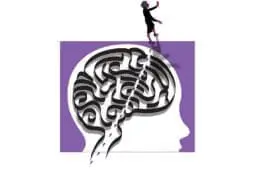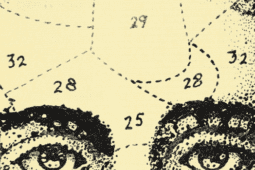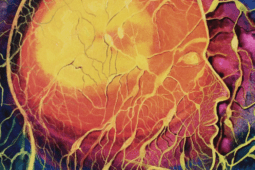Brain
Breaking Free
A Mind-Body Approach to Retraining the BrainPutting the power of neuroplasticity to work in the consulting room. Read more
Gender and the Brain
Louann Brizendine's Work Stirs New ControversyNeuropsychiatrist Louann Brizendine has stirred up plenty of controversy by arguing that men and women have very different brains. Read more
Recipe For Life
Is Attuned Eating the Answer to Diet Failure?Despite the common cultural notion that anyone can successfully lose weight---constantly reinforced by the $60 billion-a-year diet industry---at least 95... Read more
I Think, Therefore I Eat
Skills for Successful DietingFrom the viewpoint of Cognitive-Behavioral Therapy, the reason that dieters so frequently fail to stick to their healthy eating plans is simple: knowing what... Read more
It's Not About The Food
The Truth About Eating DisordersThe key to working effectively with eating disorders is understanding that starving, bingeing, and purging aren't simply bad habits. For treatment to work, it... Read more
The Case for Energy Psychology
Snake oil or therapeutic power tool?A wizened, seen-it-all psychologist describes how he came to embrace an approach that much of the orthodox psychotherapy world considers the latest incarnation... Read more
Lions Without a Cause
Men's Animal Instincts Don't Fit the Modern WorldLet's face it: love means something quite different to men and women. A look at other species of social mammals offers some remarkable insights into the... Read more
This issue examines whether our increasing knowledge of all those multisyllabic brain processes has really made us more effective practitioners. Read more
The Rise and Fall of PaxMedica
Welcome to the new era of brain-based therapyIn the 1970s, the rise of Prozac, the DSM-III, and "evidence-based" therapies brought the appearance of coherence and order to mental health professions under... Read more
Brain to Brain: January/February 2010
The talking cure goes beyond wordsAs we learn more about the brain, it becomes apparent that therapists need to pay at least as much attention to the body and nervous system (both their own and... Read more
The Brain's Rules for Change
Translating cutting-edge neuroscience into practiceFor the firs time, we're beginning to understand how to directly delete emotional meanings attributed to disturbing past events. Read more
Complexity Choir
The eight domains of self-integrationAs unlikely as it may sound, the mathematics of complexity theory could offer us the key to the elusive secrets of mental health and personal well-being. Read more
Educating Theresa
Sometimes therapy means total commitmentTreating depression requires a commitment to working with mind, body, and spirit. Read more
A Warm Bath for the Brain
Understanding oxytocin's role in therapeutic changeHow to get through to clients caught in fight-flight-freeze mode. Read more
Autism's 5 Core Deficits Defined
Building Social and Emotional SkillsBy redefining Autism's five core deficits as opportunities to practice and develop skills, you can help your child make their own choices, coregulate, and... Read more
Reversing Chronic Pain
Ten Steps to Reduce SufferingMore and more chronic pain patients are being referred to therapists after their physicians conclude that they show every appearance of being healed. Read more
1. Ride the Rhythms of Rest Fine-tune your circadian rhythms with exposure to morning light. Regularly engage in rest breaks and practices. Consider daily... Read more
Brain to Brain
Applying the Wisdom of Neuroscience in Your PracticeThis article first appeared in the September/October 2008 issue. Anyone who’s ever worked with trauma survivors knows the therapeutic challenge of... Read more
It's a Jungle in There
We're Not as Evolved as We ThinkThe human brain is an anachronistic menagerie that confronts the psychotherapist with the challenge of treating a human, a horse, and a crocodile, all... Read more
The Art of Self-justification
We're all at the mercy of cognitive dissonanceFar from being a relic of Psych 101, the theory of cognitive dissonance may have more relevance in understanding today's world than ever. Read more
The Soul of Relationship
Where Self and Other MeetMaking "contact" with our partner means first recognizing a subtle inner substrate where we encounter everything from boredom to anxiety to sexual interest to... Read more
Any Day Above Ground
After Recovery, What Then?Letting go of our childlike fascination with the promise of the future is one of the hardest challenges of truly being in the moment. Read more
Finding Daylight
Mindful Recovery from DepressionThere's increasing evidence that mindfulness helps depressed people fight relapse. Read more
Three Tenets of Acceptance and Commitment Therapy
Discovering Our Values by Confronting Our FearsLearning to accept our fears as guideposts to who we really want to be. Read more
Defining Psychotherapy
The Last 25 Years Have Taught Us That It's Neither Art nor ScienceAt last count, therapists could choose from among 500 different treatment techniques. But after all these years, there's still no evidence that the overall... Read more
Creating a Culture of Healing
Recovering from Trauma in War-Ravaged GazaA psychiatrist who's worked in Bosnia, Kosovo, and Israel leads a team of healthcare professionals into war-ravaged Gaza to see if Western healing methods can... Read more
Facing Our Worst Fears
Finding the Courage to Stay in the MomentA therapist helps his anxious clients discover that be not resisting what the present moment offers, they can find a way out of their suffering. Read more
The Precarious Present
Why is it So Hard to Stay in the Moment?All of us ruminate, bringing up the cud of old, unresolved problems. But far from being idle mind chatter, most of these mental distractions are actually the... Read more
Appointments With Yourself
Don't Mistake Your Schedule for your LifeThe search for the elusive experience of being "in the moment" isn't as complicated as you think. All it takes is a cup of tea, a walk, a question, a blessing... Read more
A Week of Silence
Quieting the Mind and Liberating the SelfHow would it feel to sit completely still for a week, not communicating with anyone, just tuning in to the seemingly chaotic jumble of your own thoughts? A... Read more















